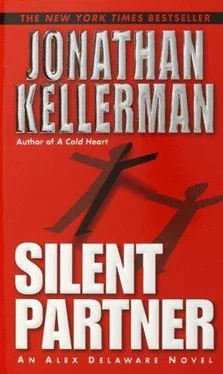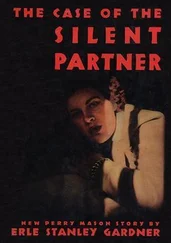Jonathan Kellerman - Silent Partner
Здесь есть возможность читать онлайн «Jonathan Kellerman - Silent Partner» весь текст электронной книги совершенно бесплатно (целиком полную версию без сокращений). В некоторых случаях можно слушать аудио, скачать через торрент в формате fb2 и присутствует краткое содержание. Жанр: Триллер, на английском языке. Описание произведения, (предисловие) а так же отзывы посетителей доступны на портале библиотеки ЛибКат.
- Название:Silent Partner
- Автор:
- Жанр:
- Год:неизвестен
- ISBN:нет данных
- Рейтинг книги:5 / 5. Голосов: 1
-
Избранное:Добавить в избранное
- Отзывы:
-
Ваша оценка:
- 100
- 1
- 2
- 3
- 4
- 5
Silent Partner: краткое содержание, описание и аннотация
Предлагаем к чтению аннотацию, описание, краткое содержание или предисловие (зависит от того, что написал сам автор книги «Silent Partner»). Если вы не нашли необходимую информацию о книге — напишите в комментариях, мы постараемся отыскать её.
Silent Partner — читать онлайн бесплатно полную книгу (весь текст) целиком
Ниже представлен текст книги, разбитый по страницам. Система сохранения места последней прочитанной страницы, позволяет с удобством читать онлайн бесплатно книгу «Silent Partner», без необходимости каждый раз заново искать на чём Вы остановились. Поставьте закладку, и сможете в любой момент перейти на страницу, на которой закончили чтение.
Интервал:
Закладка:
Willow Glen shared billing on a road sign with a Bible college twenty miles south and a state agricultural depot. The directional arrow aimed me over a covered bridge and onto a razor-straight road that cut through more farmland- citrus and avocado plantings, ramshackle stables, and untended fields. Broad slabs of blank brown space were broken by trailer parks, tin-roofed juke joints, and cinder-block churches, and surrounded by the granite drapery of the San Bernardino Mountains.
The mountains faded from rawhide to lavender-gray in the distance, the upper peaks merging with a pearly mist of sky. Heat percolated up from the lowlands, softening the contours of the pines that clung to the mountainsides, creating fringed silhouettes that recalled ink bleeding into blotting paper.
Willow Glen Road materialized as the left arm of a boulevard stop in the middle of nowhere, a sharp hook past a splintered sign advertising fresh produce and a “Jumbo Turkey Ranch,” long vacated. The blacktop twisted and climbed toward the mountains, then up into them. The air got cooler, cleaner.
Ten miles in, a few apple orchards appeared: freshly tilled small plots backed by frame houses and surrounded by barbed wire and windbreak willows, the trees cut low with wide crotches, for handpicking. Cherry-sized orbs peeked out from under sage canopies of leaf. Harvest looked to be a good two months away. Homemade signs on stakes driven into the road shoulder welcomed the U-pick crowd but there didn’t seem enough fruit to provide more than a day’s desultory picking. As the road climbed higher, neglected orchards began to dominate the landscape- larger, dusty stretches filled with dead trees, some felled, others whittled to limbless, gray-white spikes.
The asphalt ended at twin telephone-pole-sized posts banded with Chamber of Commerce and service club badges. A chain dangling from between the posts supported a sign that read WILLOW GLEN VILLAGE. POP. 432.
I stopped, looked past the sign. The village seemed to be nothing more than a tiny rustic shopping mall shaded by willows and pines and fronted by an empty parking lot. The trees parted at the far end of the lot, and the road continued as compressed dirt. I drove in, parked, and stepped out into clean, dry heat.
The first thing that caught my eye was a large black-and-white Ilama nibbling hay in a small corral. Behind the corral was a narrow frame house painted barn-red and trimmed in white. The sign over the doorway read WILLOW GLEN FUN CENTER AND PETTING ZOO. I searched for human habitation, saw none. Waved at the llama and got a ruminant stare in return.
A handful of other buildings, all small, all wooden, shingle-roofed and unpainted and connected to one another by planked walkways. HUGH’S WOODCARVER’S PARADISE. THE ENCHANTED FOREST ANTIQUE SHOPPE. GRANNY’S TREASURE TROVE, GIFTS AND SOUVENIRS. Every one shuttered tight.
The ground was cushioned by pine needles and willow leaves. I walked through it, still searching for company, spotted a flash of white and a jet of smoke rising from behind the woodcarver’s shop. Low-hanging branches blocked the view. I walked past them, saw a series of weathered wood booths bolted together under a single, brand-new red roof. As I got closer, the air got sweet- the heavy sweetness of honey mixed with the tang of apples. The trees receded and I was standing in a bright clearing.
One of the booths was labeled APPLE PRESS & CIDERY, another CLOVER HONEY. But the sweet smoke was coming from next door, a green-shuttered section designated GOLDEN DELICIOUS CAFé. DEEP DISH PIE. COBBLER. The café’s façade was whitewashed planks and stained-glass windows- windows decorated with black boughs, pink-white blossoms, green, red, and yellow apples. The door was open. I went in.
Inside everything was spotless and whitewashed- picnic tables and benches, a white ceiling fan recirculating hot, honeyed air, a Formica-topped counter and three white Naugahyde stools, hanging plants, an old brass cash register, and a mimeographed poster advertising a Yucaipa astrologer. A young woman sat behind the counter drinking coffee and reading a biology textbook. Behind her a pass-through window provided a view of a stainless-steel kitchen.
I sat down. She looked up. Nineteen or twenty, with a sharply upturned nose, clipped curly blond hair, and wide dark eyes. She wore a white shirt and black jeans, was slim but hippy. A green-apple badge on her shirt said WENDY.
She smiled. Maura Bannon’s age. Less sophisticated, no doubt, but somehow older than the reporter.
“Hi. What can I get you?”
I pointed to her coffee cup. “How about some of that, for starts.”
“Sure. Cream and sugar?”
“Black.”
“Would you like a menu?”
“Thanks.”
She handed me a plasticized rectangle. The selection surprised me. I’d expected burgers and fries, but a dozen entrees were listed, some of them complex, with a nod toward nouvelle , each tagged with letters indicating the proper wine: C for Chardonnay, JR for Johannesburg Riesling. On the back of the menu was a full wine list- good-quality French and California vintages as well as a locally produced apple wine described as “light and fruity, similar in nose and flavor to Sauvignon blanc.”
She brought the coffee. “Something to eat?”
“How about an apple picker’s lunch?”
“Sure.” She turned her back on me, opened a refrigerator and various drawers and cabinets, tinkered for a while, put cutlery and a linen napkin on the counter, and served up a platter of perfectly sliced apples and thick wedges of cheese, garnished with mint.
“Here you go,” she said, adding a whole-wheat roll and butter molded into flowers. “The goat cheese is really good, made by a family of Basques out near Loma Linda. Organically fed animals.”
She waited.
Olivia’s eggs still sat in my stomach. I took a small bite. “Terrific.”
“Thanks. I’m studying food presentation in college, want to run my own place some day. I get to use working here as part of my independent studies.”
I pointed at the textbook. “Summer school?”
She grimaced. “Finals. Tests aren’t my specialty. More coffee?”
“Sure.” I sipped. “Kind of quiet today.”
“Every day. During picking season, September through January, we get a handful of tourists on weekends. But it’s not like it used to be. People know about cherry picking in Beaumont but we haven’t gotten much publicity. It didn’t used to be that way- the village was built in 1867; people used to go home with bushel baskets of Spartans and Jonathans. But city people came and bought up some of the land. Didn’t take care of it.”
“I saw dead orchards on the way up.”
“Isn’t it sad? Apples need care- just like children. All those doctors and lawyers from L.A. and San Diego bought the orchards for taxes, then just let them die. We’ve been trying- my family and me- to get the place going again. The Orange County Register might run a piece on us- that would sure help. Meanwhile we’re getting the jam and honey going, starting to do real good with mail order. Plus, I cook for the rangers and aggie commissioners passing through, get my independent study taken care of. You with the state?”
“No,” I said. “What’s with the Ilama?”
“Cedric? He’s ours- my family’s. That’s our house behind his pen- our village house. Mom and my brothers are in there, right now, planning out the zoo. We’re going to have a full-fledged petting zoo by next summer. Keep the little kids busy so the parents can shop. Cedric’s a doll. Dad got him in trade- he’s a doctor, has a chiropractic practice down in Yucaipa. That’s where we live most of the time. There was this circus coming through- gypsies or something like that, in these painted wagons, with accordions and tape machines. They set up in one of the fields, passed the hat. One of the men sprained his back doing acrobatics. Dad fixed him up but the guy couldn’t pay, so Dad took Cedric in trade. He loves animals. Then we got the idea for the petting zoo. My sister’s studying animal husbandry at Cal Poly. She’s going to run it.”
Читать дальшеИнтервал:
Закладка:
Похожие книги на «Silent Partner»
Представляем Вашему вниманию похожие книги на «Silent Partner» списком для выбора. Мы отобрали схожую по названию и смыслу литературу в надежде предоставить читателям больше вариантов отыскать новые, интересные, ещё непрочитанные произведения.
Обсуждение, отзывы о книге «Silent Partner» и просто собственные мнения читателей. Оставьте ваши комментарии, напишите, что Вы думаете о произведении, его смысле или главных героях. Укажите что конкретно понравилось, а что нет, и почему Вы так считаете.












